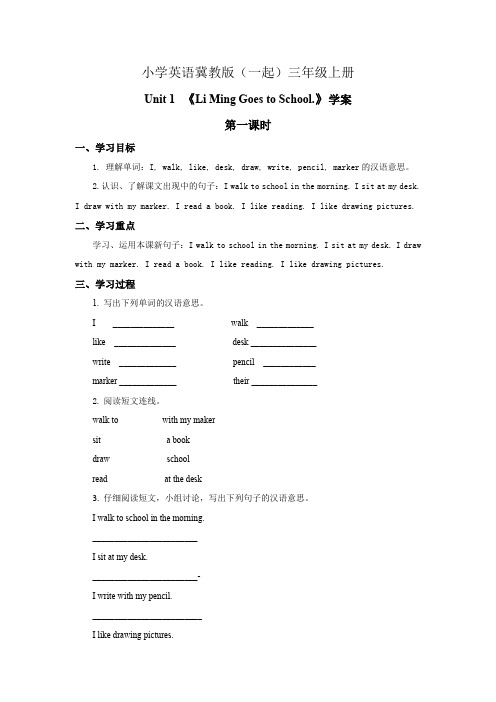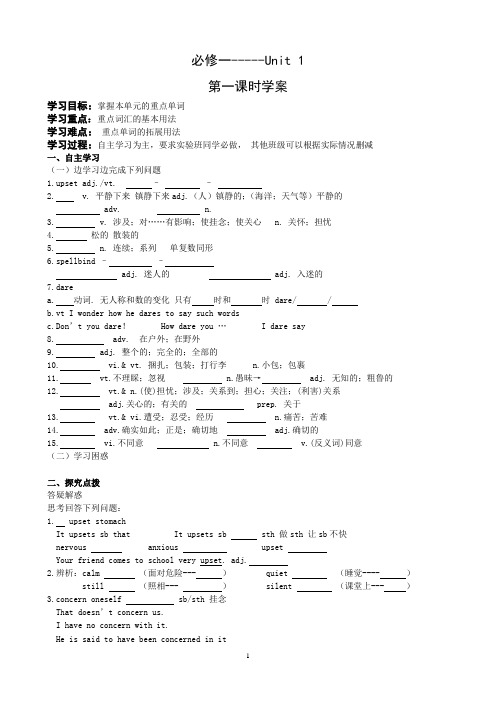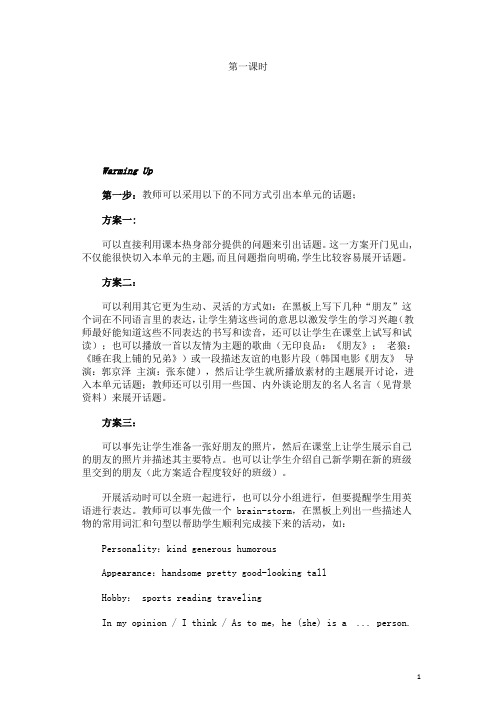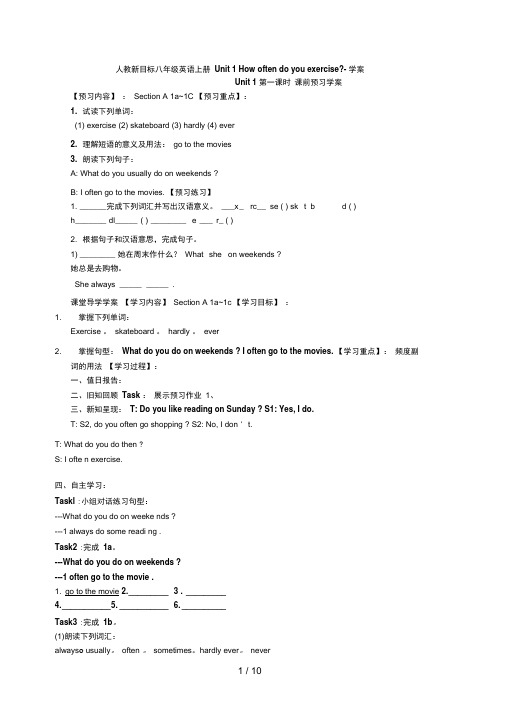Unit One 第一课时学案 1a
- 格式:doc
- 大小:54.50 KB
- 文档页数:3

小学英语冀教版(一起)三年级上册Unit 1《Li Ming Goes to School.》学案第一课时一、学习目标1. 理解单词:I, walk, like, desk, draw, write, pencil, marker的汉语意思。
2.认识、了解课文出现中的句子:I walk to school in the morning. I sit at my desk.I draw with my marker. I read a book. I like reading. I like drawing pictures.二、学习重点学习、运用本课新句子:I walk to school in the morning. I sit at my desk. I draw with my marker. I read a book. I like reading. I like drawing pictures.三、学习过程1. 写出下列单词的汉语意思。
I ______________ walk _____________like ______________ desk _______________write _____________ pencil ____________marker _____________ their _______________2. 阅读短文连线。
walk to with my makersit a bookdraw schoolread at the desk3. 仔细阅读短文,小组讨论,写出下列句子的汉语意思。
I walk to school in the morning.________________________I sit at my desk.________________________-I write with my pencil._________________________I like drawing pictures.___________________________I draw with my marker.______________________________I like reading._______________________________4.读一读课本Part1,把其中会读的句子用铅笔画出来。

必修一-----Unit 1第一课时学案学习目标:掌握本单元的重点单词学习重点:重点词汇的基本用法学习难点:重点单词的拓展用法学习过程:自主学习为主,要求实验班同学必做,其他班级可以根据实际情况删减一、自主学习(一)边学习边完成下列问题1.upset adj./vt. ––2. v. 平静下来镇静下来adj.(人)镇静的;(海洋;天气等)平静的adv. n.3. v. 涉及;对……有影响;使挂念;使关心 n. 关怀;担忧4. 松的散装的5. n. 连续;系列单复数同形6.spellbind ––adj. 迷人的 adj. 入迷的7.darea. 动词. 无人称和数的变化只有时和时 dare/ /b.vt I wonder how he dares to say such wordsc.Don’t you dare!How dare you … I dare say8. adv. 在户外;在野外9. adj. 整个的;完全的;全部的10.vi.& vt. 捆扎;包装;打行李 n.小包;包裹11. vt.不理睬;忽视 n.愚昧→ adj. 无知的;粗鲁的12. vt.& n.(使)担忧;涉及;关系到;担心;关注;(利害)关系adj.关心的;有关的 prep. 关于13. vt.& vi.遭受;忍受;经历 n.痛苦;苦难14. adv.确实如此;正是;确切地 adj.确切的15. vi.不同意 n.不同意 v.(反义词)同意(二)学习困惑二、探究点拨答疑解惑思考回答下列问题:1. upset stomachIt upsets sb that It upsets sb sth 做sth 让sb不快nervous anxious upsetYour friend comes to school very upset. adj.2.辨析:calm (面对危险--- ) quiet (睡觉---- )still (照相--- ) silent (课堂上--- )3.concern oneself sb/sth 挂念T hat doesn’t concern us.I have no concern with it.He is said to have been concerned in itP lease don’t be concerned about itthe people 有关联的人 the expression 忧愁的表情辨析:concern anxietycare worryas far as I 依我之见4.I bought these cakes loose.5.A series of TV play on6.He rushed out of the room before I could say a wordI must write it down before forget itHe had hardly entered the room before he heard a loud noise before = whenIt be + +before …之后才…It will be 10 years before he comes back 表将来It be + + before …不久就…It wasn’t long before he told me about itI am willing to work myself to death before I give up 有表意愿词,意为7.辨析:because— as—Since— for—8.far/much —程度远远地大大地修饰very—by far--…得多The one is better by far She is by far the best三、总结升华四、高效训练S:新词基础强化练:1. such a heavy loss,the businessman didn't have the courage to go on.A.Having sufferedB.Having suffered fromC.SufferingD.Suffering from2.Please keep while I take a photograph of you.A.stillB.calmC.quietD.silent3.The man put down the phone with a long face,obviously about the information he received.A.contentB.amazedC.happyD.upset用calm,quiet,silent,still填空They moved to the countryside and lived a life.Children find it difficult to sit for very long.Although she was frightened,she answered in a voice.It's bad manners to keep when the teacher asks you a question.SS:新知旧知整合练:1.The workers risked their lives to restore communications in the disasterstricken areas,which were cut off________the powerful earthquake.A.in case of B.in spite of C.instead of D.because of2.I give him a piece of advice that he________a blue or grey suit to the interview.A.wears B.should wear C.wore D.will wear3.I am leaving my________position because I cannot show my capabilities fully here.A.present B.private C.individual D.personal4.Mr.Li,our teacher of English,talked with me face to face,which made me recognize________sillymistakes I had made.A.that B.what C.how D.which5.Not having a good________of English can be a serious obstacle to achieving your goals.A.demand B.appreciation C.experience D.commandSSS:备战高考模拟练:One of the greatest stories of rags to riches success is that of Andrew Carnegie,who started life in poverty but became one of the richest men in the world.Carnegie was born in Scotland in 1835,the son of a weaver.In 1848,the family moved to the United States and at 13 Carnegie began to work in a cotton mill,earning $1.5 per week.About three years later,he found a better job as a telegraph messenger boy.At work,his superiors(上级) were impressed by his abilities and willingness to work hard.In 1853,he gained an office job at the Pennsylvania Railroad Company.This was his first big break.He continued to impress and rose rapidly through the company,gaining_more_and_more_responsibility.At the same time,Carnegie loved reading very much and made use of every opportunity to visit the library.He read widely on all subjects,particularly literature.Carnegie now began to save a little money and,with the help of his employer,began to make some successful investments.He invested in the iron industry and eventually set up in business himself,owning several iron and steel plants.This was where he made his fortune.By the 1890s,the Carnegie Steel Company was the biggest and most profitable business in the world.Carnegie had always believed that the pursuit(追求) of wealth was never an end in itself.In his view,successful,wealthy people should redistribute their wealth for the benefit of everyone in society.True to his word,in 1901,at the age of 66,he retired from business and devoted the rest of his life to charity work.Carnegie's lack of formal education and his poor family background clearly didn't put barriers in the way of success.His rapid rise from poverty to wealth was due to his willingness to work hard,his intelligence and good business sense,and his talent for making things happen.He died in 1919 at the age of 83.1.What can be learnt from the text?A.Carnegie's employers had a high opinion of him.B.Carnegie made the investments independently after saving enough money.C.Carnegie believed that we should try to earn as much money as possible in our life. D.Carnegie could have been more successful if he had been formally educated.2.What does “gaining more and more responsibility” in the second paragra ph most probably mean? A.Becoming more and more intelligent.B.Being promoted to higher ranks.C.Having a better sense of confidence.D.Reading more and more books.3.When did Carnegie get his first big success in his life?A.When he took a job as a telegraph messenger boy.B.When he worked at the Pennsylvania Railroad Company.C.When he made investments in the iron industry.D.When he founded the Carnegie Steel Company.4.Which of the following will be the suitable title for the text?A.Andrew Carnegie:A Wealthy ManB.Steel & Iron:The Most Profitable BusinessC.From Rags to Riches:The Story of Andrew CarnegieD.Intelligence and Good Business Sense:Two Factors in Becoming Wealthy五、学习反思必修一-----Unit 1第二课时学案学习目标:掌握本单元的重点短语学习重点:重点短语的基本含义和用法学习难点:重点短语的拓展使用学习过程一、自主学习(一)边学习边完成下列问题1. 加相加2. 对…厌烦get /be tired doing / sth 因..而厌烦3.finish 结束做某事4.plan 计划做某事5. 度假6.pay / sth / sb sth 为(做)某事/某物支付某人7. 课后8.say no sb. 拒绝某人9. purpose 故意10.someone paper 别人的纸11. =have to 不得不12. 不必13. 经历经受浏览完成14. 放下;记下;登记15.grow/be crazy 对…痴迷拼命地It’s crazy sb 某人真是疯狂be crazy 疯狂/痴迷做某事16.have sth/ nothing 与…有关/无关辨析:do with ---用提问deal with ---用提问Meat was so expensive that we had to do with vegetables in those days“”—不用do without “ ”We can’t do without a telephone in our business17.have the power sth / doing sth 有能力做18.with复合结构:with+ +19.have some trouble/difficulty +n. (做)某事有困难have some trouble/difficulty doing sth 做某事有困难municate sb 交流communicate sth sb 转告21. 在黄昏时刻22. 面对面地23. 与某人相爱(二)学习困惑二、探究点拨答疑解惑思考回答下列问题:1. 合计add to = add that 包括2.情态动词+ have donea. have done 本该做而没做have done 本不该却做了b. have done 一定做过c. have done 过去或现在已经完成的否定推测不可能做过d. have done 疑问句可能做过…吗?e. have done 本愿做却没做f. have done 理应= have doneought have doneg. have done 本需而没做have done:没必要做却做了:没必要做实际也没做3. 动身出发延迟拨慢表着手做出发提出拨快开办创设竖起着手4.执政:不能胜任的:5.辨析:power- strength- force- ability- energy-6. 词短语:at the moment 此刻for a moment 一会for the moment 目前in a moment 一会后词:the moment7.辨析:fall in love 强调be in love 强调8.辨析:join join inattend take part in三、总结升华四、高效训练S:新词基础强化练:1.Add your scores up and we’ll see who won.These numbers add up to 100.Will you please add some milk to my coffee?2.It should have rained last night, for the ground is wet.He can’t have gone to Beijing, for I saw him in the room just now.There’s no light in the room, can they have gone out?He could have been ill, for he wasn’t at workI would have come yesterday.I needn’t have bought so much wine—only 5 people cameSS:新知旧知整合练:1.—Mike,this is for you.Happy birthday!—e in and have a seat.________.A.Make yourself at home B.Take it easyC.Don't mention it D.I'm happy to see it2.I've finished my essay,but I just need to_______it to check for spelling mistakes.A.go through B.go down C.go off D.go away3.—They_______have arrived already.—How can you be so sure?It's only a few minutes' ride.A.shouldn't B.mustn't C.may not D.can't4.By the time Mr.Smith arrives at the supermarket,we_______there for one hour.A.shall stay B.have stayedC.will have stayed D.have been staying5.—Remember the first time we met,Linda?—Of course I do.Y ou______as a volunteer during the Beijing Olympic Games.A.worked B.had worked C.were working D.would work6.In the yard was an old man telling stories,with quite a few children_______him.A.to surround B.surrounded C.surrounding D.being surrounded 7.—What do you think of the Chinese language today?—Quite popular.It________communicating with other countries.More and more foreign friends are learning Chinese now.A.plays an important role in B.gets along well withC.is based on D.is made use of8.I was about to give up when I_____a good idea.A.came about B.came out C.put up with D.came up with9.It is requested that the reporter________to blame for the wrong report.A.referring to B.referring to asC.referred to be D.referred to being10.The reason why she didn't accept the job was________she was offered a better position byanother company.A.because B.what C.which D.thatSSS:备战高考模拟练:1.In the evening the car broke down suddenly and the heavyrain the helplessness of the girl driver on thecountry road.A.resulted fromB.made upC.turned outD.added to2.I used to quarrel a lot with my parents,but now we fine.A.look outB.stay upC.carry onD.get along3.All these gifts must be mailed immediately in time for Christmas.A.in order to have receivedB.in order to receiveC.so as to be receivedD.so as to be receiving4.Mrs.Noland,who was born in a poor family, a lot of sufferings when she was still a child.A.went along withB.went back onC.went throughD.went into5.—Have you seen my notebook?—Oh,Jane must have taken it;she has the same one as yours.A.on purposeB.by chance C .by accident D.by mistake五、学习反思必修一-----Unit 1第三课时学案学习目标:掌握本单元的重点句型学习重点:本单元重点句型的用法学习难点:句型中涉及知识点的迁移用法学习过程一、自主学习(一)边学习边完成下列问题1. 做sth 无用do good to be good sb. / sth2.tell him/her that if the camera is broken again, he/she will have to pay to get it repaired.a.get / ask / tell O let /make O ----be madehave O 有/ 让b.get O3.Y our friend, who doesn’t work hard, asks you to help him/her cheat in the exam by looking at your paper cheat.a.v.cheat sb sth 骗sb sth cheat sb sb’s .money 骗钱cheat sb the belief that 骗sb 相信cheat sb doing sth 骗sb 做sthb.n.骗子It’s really a cheat.4.While walking the dog, you were careless.时间/条件/让步状语从句中,如果出现以下两种情况所列成分可省a. +b.5.Make a list of reasons why friends are important to you 从句语序reasona.n.a / the reason for sth / doing sth / to do sth句中用why / 句中用thatb.v.Man alone can reason.c.adj.His argument was well reasonedd.reason + 推理为reason sb. 规劝reason sb. doing sth 说服reason 想出答案等e.reason—reasoncause--- causeexcuse—excuse6.Why don’t you put the meat in the fridge?It will stay fresh for several days.stay:动词= 不用于7.It just so happened that I had met him beforea.=I happened to have met him beforeb.happen 正在做happen 做过8.It/This is/was time for sb sth /that +9.I am only able to look at nature through dirty curtains hanging before very dusty windowsa.hanging 修饰sth 常用b.nature大自然--前无本性本质-- 有10.I wonder if it's because I haven't been able to be outdoors for so long that I've grown so crazy about everythingto do with nature.注意:该句是含有的强调句,强调的是句子的原因状语because I haven't been able to beoutdoors。

第一课时Warming Up第一步:教师可以采用以下的不同方式引出本单元的话题;方案一:可以直接利用课本热身部分提供的问题来引出话题。
这一方案开门见山,不仅能很快切入本单元的主题,而且问题指向明确,学生比较容易展开话题。
方案二:可以利用其它更为生动、灵活的方式如:在黑板上写下几种“朋友”这个词在不同语言里的表达,让学生猜这些词的意思以激发学生的学习兴趣(教师最好能知道这些不同表达的书写和读音,还可以让学生在课堂上试写和试读);也可以播放一首以友情为主题的歌曲(无印良品:《朋友》; 老狼:《睡在我上铺的兄弟》)或一段描述友谊的电影片段(韩国电影《朋友》 导演:郭京泽 主演:张东健),然后让学生就所播放素材的主题展开讨论,进入本单元话题;教师还可以引用一些国、内外谈论朋友的名人名言(见背景资料)来展开话题。
方案三:可以事先让学生准备一张好朋友的照片,然后在课堂上让学生展示自己的朋友的照片并描述其主要特点。
也可以让学生介绍自己新学期在新的班级里交到的朋友(此方案适合程度较好的班级)。
开展活动时可以全班一起进行,也可以分小组进行,但要提醒学生用英语进行表达。
教师可以事先做一个 brain-storm,在黑板上列出一些描述人物的常用词汇和句型以帮助学生顺利完成接下来的活动,如:Personality:kind generous humorousAppearance:handsome pretty good-looking tallHobby: sports reading travelingIn my opinion / I think / As to me, he (she) is a ... person.He(She) always wears ....He(She) looks like....We always do ... together.第二步:学生完成课本热身部分的问卷调查。
在一些学生程度较好的班级,教师还可利用网络或其它资源对原有的问卷进行一定的补充,丰富问卷内容(见背景资料),让学生计算得分并根据教师公布的各分数段所对应的性格类型得出自己的调查结果;(在调查过程中,教师可以对问卷内容中的部分新单词和词组作简单的解释以帮助学生顺利完成问卷。

人教新目标八年级英语上册Unit 1 How often do you exercise?- 学案Unit 1 第一课时课前预习学案【预习内容】:Section A 1a~1C 【预习重点】:1. 试读下列单词:(1) exercise (2) skateboard (3) hardly (4) ever2. 理解短语的意义及用法:go to the movies3. 朗读下列句子:A: What do you usually do on weekends ?B: I often go to the movies. 【预习练习】1. ______ 完成下列词汇并写出汉语意义。
___x _ rc __ se ( ) sk t b d ( )h _______ dl _____ ( ) ________ e ___ r_ ( )2. 根据句子和汉语意思,完成句子。
1) ________ 她在周末作什么?What she on weekends ?她总是去购物。
She always _____ _____ .课堂导学学案【学习内容】Section A 1a~1c 【学习目标】:1. 掌握下列单词:Exercise 。
skateboard 。
hardly 。
ever2. 掌握句型:What do you do on weekends ? I often go to the movies. 【学习重点】:频度副词的用法【学习过程】:一、值日报告:二、旧知回顾Task :展示预习作业1、三、新知呈现:T: Do you like reading on Sunday ? S1: Yes, I do.T: S2, do you often go shopping ? S2: No, I don ' t.T: What do you do then ?S: I ofte n exercise.四、自主学习:Taskl :小组对话练习句型:---What do you do on weeke nds ?---1 always do some readi ng .Task2 :完成1a。

《牛津小学英语》1A Unit 1教学设计一、教材分析《牛津小学英语》1A 是小学英语学习的起始阶段,Unit 1 作为开篇单元,主要围绕“Hello”这一主题展开,旨在引导学生初步接触英语,激发学习兴趣,建立英语学习的基础。
本单元的重点词汇包括“hello”“hi”“I”“am”等,重点句型为“Hello,I'm”。
通过简单的对话和活动,帮助学生学会用英语打招呼并介绍自己。
二、学情分析一年级的学生刚刚接触英语,处于语言学习的启蒙阶段。
他们对新鲜事物充满好奇心,具有较强的模仿能力和表现欲,但注意力难以长时间集中,需要通过生动有趣的教学活动来吸引他们的注意力,激发学习兴趣。
三、教学目标1、知识目标能听懂、会说“hello”“hi”,并能用这两个词打招呼。
能听懂、会说“I'm”,并能用这个句型介绍自己。
能认识书中出现的人物形象。
2、技能目标能够在实际情境中运用“hello”“hi”和“I'm”进行简单的交流。
培养学生的听说能力和初步的语言运用能力。
3、情感目标激发学生学习英语的兴趣,培养积极参与、大胆开口的学习态度。
培养学生的文明礼貌意识。
四、教学重难点1、教学重点掌握“hello”“hi”和“I'm”的正确发音和用法。
能够用英语自信地打招呼并介绍自己。
2、教学难点“I'm”的连读发音。
让学生理解并运用所学句型进行实际交流。
五、教学方法1、情景教学法通过创设生动的情景,让学生在实际情境中学习和运用英语。
2、游戏教学法设计有趣的游戏活动,如猜谜语、角色扮演等,增加学习的趣味性,提高学生的参与度。
3、歌曲教学法利用欢快的英语歌曲,帮助学生巩固所学知识,培养语感。
六、教学过程1、导入(Warming up)播放一首欢快的英语歌曲“Hello Song”,让学生跟着歌曲一起唱,营造轻松愉快的英语学习氛围。
展示一些可爱的卡通人物图片,如米老鼠、唐老鸭等,用中文问学生是否认识,然后用英语说“Hello, Mickey Mouse”“Hello, Donald Duck”,引出“hello”这个单词。

一年级上册英语教案 Unit One Lesson 1 北京版教学内容本节课是一年级上册英语的第一课,教学内容围绕北京版英语教材Unit One的Lesson 1展开。
本节课主要介绍基础的英语字母和日常用语,包括字母A到Z的学习,以及一些简单的问候语和自我介绍的表达方式。
通过本节课的学习,学生将能够识别并书写26个英文字母,并能用英语进行基础的交流。
教学目标1. 学生能够正确识别并书写26个英文字母。
2. 学生能够用英语进行简单的问候和自我介绍。
3. 学生能够理解并运用基本的英语日常用语。
4. 培养学生对英语学习的兴趣和积极性。
教学难点1. 字母的书写和发音对于一年级的学生来说可能有一定的难度。
2. 学生在初次接触英语时,可能会对英语的发音和语调感到不熟悉。
3. 对于一些基础词汇的理解和运用,学生可能需要较多的练习和指导。
教具学具准备1. 英语字母卡片2. 课本和练习册3. 白板和彩色粉笔4. 录音机或音响设备5. 英文儿歌或动画片片段第一阶段:热身活动教师与学生用中文进行简单的问候,营造轻松愉快的学习氛围。
播放英文儿歌或动画片片段,让学生初步接触英语,激发学习兴趣。
第二阶段:字母学习教师展示字母卡片,引导学生跟读并模仿字母的发音。
教师在白板上书写字母,学生跟随书写,教师纠正学生的书写姿势和笔画顺序。
通过游戏或比赛的方式,巩固学生对字母的识别和书写能力。
第三阶段:日常用语学习教师通过图片或实物,教授一些简单的英语日常用语,如“Hello”、“Goode”、“My name is”等。
学生跟随教师朗读并模仿,教师纠正发音和语调。
通过角色扮演或小组对话的方式,让学生实际运用所学日常用语。
布置课后作业,如书写字母、朗读日常用语等。
板书设计1. 26个英文字母的书写和发音。
2. 常用问候语和自我介绍的表达方式。
3. 课后作业的要求和提示。
作业设计1. 书写26个英文字母,每个字母书写5遍。
2. 跟读并模仿本节课所学的日常用语。
第1课时Unit 1 My name 's Gina (总第5课时)Section A 1a—2c【学习目标】:1、熟悉掌握词汇P1--22、学会介绍自己并询问他人姓名,能够利用所学知识进行打招呼.3、能听懂听力对话并能对根据听力对话进行自由交际.【学习重点】:使学生学会打招呼和介绍自己,并询问他人姓名的句型.Hello, I’m …. Nice to meet you . What's your/his/her name ? My/his/her name is …. 【学习考点】:听力与对话【学习过程】:一、自主学习(教师寄语:Knowledge is power.)学习任务一: 熟悉掌握词汇1、读和记单词6分钟,2.小组展示和检查(4分)我的__________ 名字__________ 是__________ name is = __________ 钟__________ 我的__________ 是__________ 我是__________好的__________;遇见__________;遇见__________ 你__________;你们__________ 什么__________What is=__________ 你的__________;你们的__________喂__________嗨__________ 他的__________和__________;她的__________问题__________;回答__________ 看__________第一的__________ 名字__________学习任务二: 学会介绍自己并询问他人姓名,能够利用所学知识进行打招呼.1、教师自我介绍,引导学生介绍自己.A: Hello , I am Gina , What's your name ?B: My name is Alan .2、小组竞赛, 两人一组,询问他人姓名,介绍自己.3,、分角色朗读1A对话.学习任务三: 能听懂听力对话并能对根据听力对话进行自由交际.1,、听录音, 完成1a—2c听力练习。
专注:心无旁骛,万事可破新人教版七年级英语下册unit1第1课时导学案单元总览类别课程标准要求掌握的项目单元话题Talk about abilities:In this unit, students learn how to talk about what club they want to join and writethe advertisement for jobs.重点单词1.guitar(n.)2.sing(v.)3.swim(v.&n.)4.dance(v.&n.)5.draw(v.)6.chess(n.)7.speak(v.)8.join(v.)9.club(n.)10.tell(v.)11.story(n.)12.write(v.)13.show(n.&v.)14.talk(v.&n.)15.drum(n.)16.piano(n.)17.violin(n.)18.also(adv.)19.people(n.)20.home(n.&adv.)21.make(v.)22.today(adv.)23.center/centre(n.)24.weekend(n.)25.teach(v.)26.mus ician(n.)重点词组1.play chess2.speak English3.be good at…4.talk to…5.play the drums6.play the piano7.pla y the violin8.be good with…9.make friends10.help(.)with sth.11.on the weekend重点句式1.—Can you swim?—Yes,I can./No,I can’t. 2.—Can she speak English? —Yes,she can./No,sh e can’t.3.—What club do you want to join?—I want to join the music club.4.—What can you do? —I can dance.单元语法1.要求掌握情态动词can的用法,包括一般疑问句、特殊疑问句和否定句;2.要求学生会用目标语言Can you…?等仿写招聘广告。
Unit One 第一课时学案1a-2c课型:读写课备课人:刘明悦余慧一、学习目标:1、知识目标:1)会读会写下列生词:surf , shop, exercise,2)了解并且掌握频率副词的用法。
2、能力目标:了解并且掌握一般现在是的构成及其含义3、情感目标:学会利用一般现在时描叙生活中经常反复发生的事情。
二、自学文本:1、朗读下列短语:朗读P1,1C,结合1A图片,编写对话。
2、朗读p1,1B,总结表示频率的副词。
3、一般现在时如何构成?标志词有哪些?4、你还有什么问题?记录下来。
三、知识梳理:朗读记忆下列短语1.(1)go to the movies去看电影(2)watch TV看电视(3) take/do exercise锻炼(4).surf the Internet上网(5).play soccer踢足球(6). do homework做作业2.(1).do some reading 阅读(2)do some shopping 购物(3)do some cleaning 打扫3.(1) go shopping去购物(2). go skateboarding去滑板(3) go shopping 购物(4) go swimming 去游泳4.(1)hardly ever很少(2)once a week每周一次(3)twice a month每月两次(4). three times a year 每年三次(5)every day 每天(6). on weekends 在周末(7). once or twice a week 每周一两次(8). three or four times a week 每周三四次5.(1).your favorite program你最喜欢的节目(2).Animal World 动物世界四、技能迁移( )1.I like English very much,so I __________ listen to the tape in the morning.uallyB.hardly everC.never( )2.—What does your father do in the evening?—He usually __________.A.watch TVB.exercisesC.read books( )3. — ____________ do you go skating?— Every day.A.How oftenB.How manyC.When( )4. Most students in my class ________exercise every day.A.doesB. do C.is doing D. are doing( )5.-______ students in your class are from Beijing? -Only one.A.How often B.How many C.How much( )6.-______do your grandparents come to see you? -Twice a week.A.How often B. How many C.When( )7. What ________ she ______ on weekends?A.is, doB.does, does C.do, do D.does, do( )8 The old man is well because he often__________.A. exercisesB. drinksC. sleepsD. plays( )9.—How often does he exercise? —______________________.A. He is twelveB.He exercises by busC.Twice a weekD.About one hour.( )10. Katrina reads English books three ________________ four times a week.A. atB. inC. toD. of( ) 11. Do you like to go _______________?A. skateboardB. to skateboardingC. a skateboardingD. skateboarding五、综合训练(一) 句型转换1、He does his homework every day.(1) 否定句。
He ________ _________ his homework every day.(2) 一般疑问句。
________ he ________ his homework every day?2、He goes skateboarding twice a week.(提问)_______ __________ ___________ he goes skateboarding?3、Lin Tao always helps me with my Chinese. (对划线部分提问)_________ _________does Lin Tao help you with your Chinese?4. Tom goes to bed at ten in the evening. (改为否定句)Tom ________ _______ to bed at ten in the evening.(二)Mary is an American girl. She is now in Beijing with her parents. Mary doesn't know much Chinese, but she is studying it. She often speaks Chinese with her Chinese friends. Sometimes they can't understand her, because she can't speak Chinese very well. It's Saturday morning. She goes out. She is walking in the street. She wants to go to the zoo to see the elephants and monkeys, but she doesn't know how to get there. She asks a Chinese boy the way. The boy can't understand her. Then she takes out a pen and a piece of paper. She draws an elephant on it, and shows the picture to the boy. The boy understands, and shows her the way to the zoo.( )1. Mary is__________ .A. ChineseB. EnglishC. JapaneseD. American( )2. Mary is in__________ with her parents now.A. ShanghaiB. BeijingC. New YorkD. London( )3. Mary doesn't know how to get to__________ .A. the zooB. the parkC. her homeD. her school( )4. Mary can't speak__________ very well.A. EnglishB. EnglandC. ChinaD. Chinese( )5. At last The boy__________ .A. can understand Mary'sChineseB. takes her to the zooC. shows her the way to the zooD. draws a picture for Mary, too第2课时Section A 3—4课型:读写课备课人:刘明悦余慧【学习目标】1.词汇: 本课的单词与短语2.读懂3中的材料,会表述相关内容。
【Important points】能运用本课词汇及句型进行自由交际对话.【Difficult points】一般现在时态的熟练运用【Learning process】一、自主学习Task 1. 课前热身:词汇比拼(1)个人记读单词3分钟(2)两人一组相互检查读音(3)展示,写在学案上单词:大多数的____________;大部分的____________;几乎全部的___________ 结果;成果___________活跃的;积极的_____________ 对于;关于_____________约摸;大约___________________短语:每天______________一周一到二次________________一周三到四次_______________________在格林高中___________________ 至于;关于________________大多数学生__________________一些学生___________________Task 2. 学习3部分1、利用所给图表数据填all、most 、some、或noall=100% most=51%--99% some=1%--50% no=0%Activity Every Day Once or Twice a Week Three or Four Times a WeekExercise 15%()10%()75%()Do homework 95%()0%()5%()Watch TV 85%()2%()13%()2、(1)根据表格1完成短文。
阅读并进行质疑。
(2)知识点拨a. Here are the results of the student activity survey at Green High School.翻译:该句为倒装句,其主语为the results of the student activity survey. “Here +be+主语”是英语中常见的倒装句型。
例如:高小姐,送给你一些鲜花。